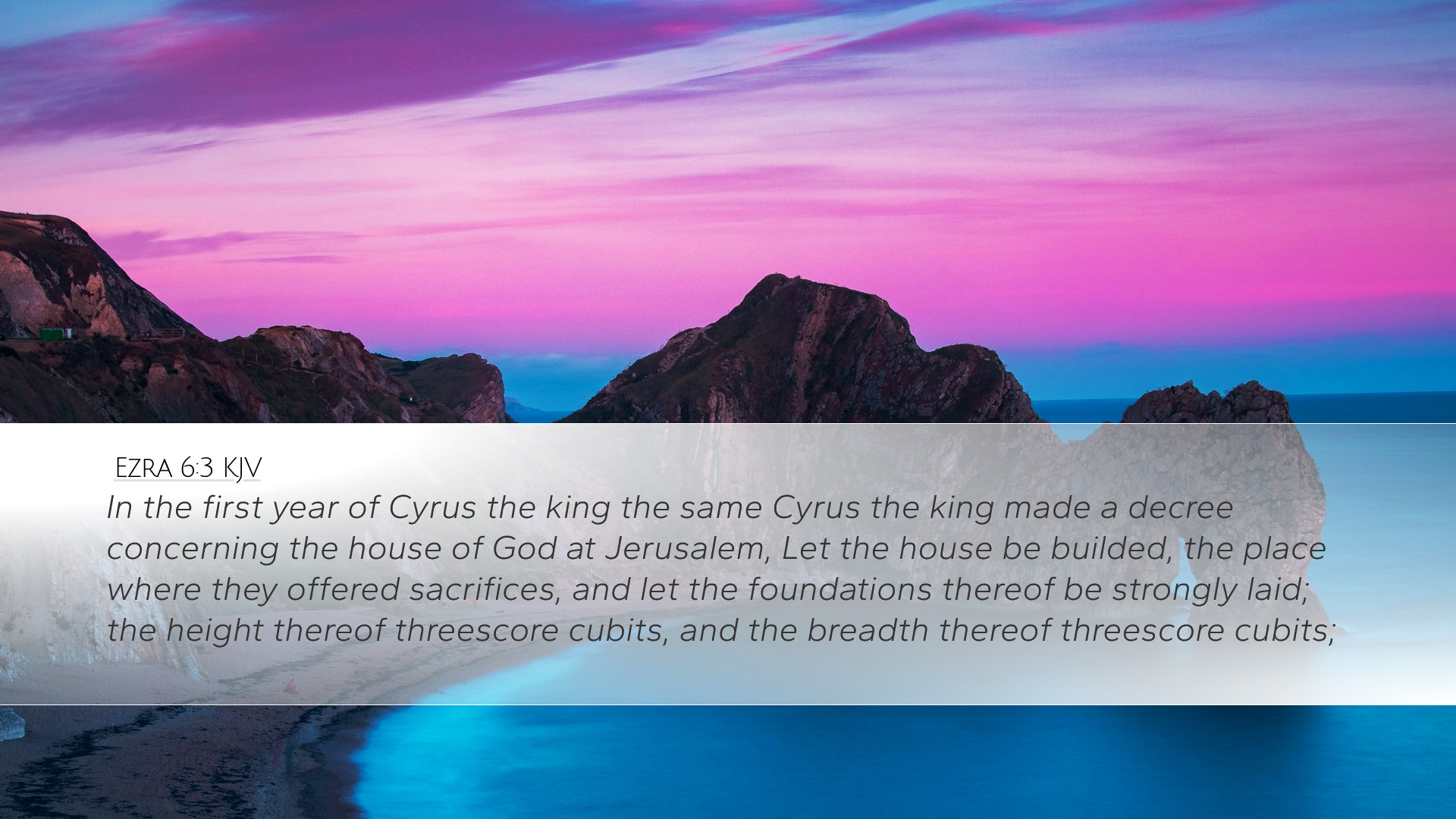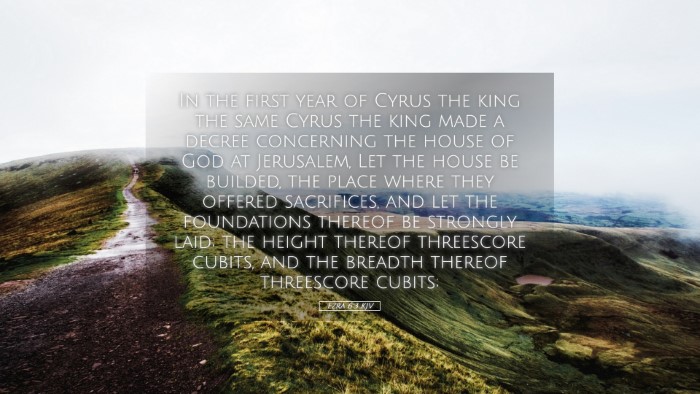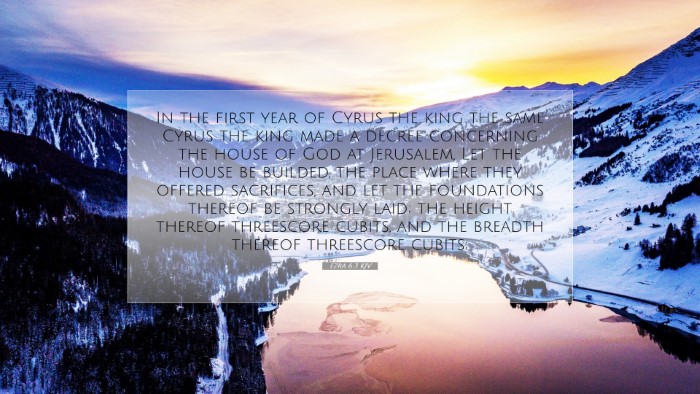Old Testament
Genesis Exodus Leviticus Numbers Deuteronomy Joshua Judges Ruth 1 Samuel 2 Samuel 1 Kings 2 Kings 1 Chronicles 2 Chronicles Ezra Nehemiah Esther Job Psalms Proverbs Ecclesiastes Song of Solomon Isaiah Jeremiah Lamentations Ezekiel Daniel Hosea Joel Amos Obadiah Jonah Micah Nahum Habakkuk Zephaniah Haggai Zechariah MalachiEzra 6:3
Ezra 6:3 KJV
In the first year of Cyrus the king the same Cyrus the king made a decree concerning the house of God at Jerusalem, Let the house be builded, the place where they offered sacrifices, and let the foundations thereof be strongly laid; the height thereof threescore cubits, and the breadth thereof threescore cubits;
Ezra 6:3 Bible Commentary
Commentary on Ezra 6:3
Ezra 6:3 states: "In the first year of Cyrus the king, Cyrus the king made a decree concerning the house of God at Jerusalem, Let the house be built, the place where they offered sacrifices, and let the foundations thereof be strongly laid: the height thereof threescore cubits, and the breadth thereof threescore cubits."
Introduction
This verse serves as animportant connection in the narrative of the return of the Jewish exiles from Babylon and the rebuilding of the temple after their long captivity. The decree of Cyrus not only fulfills prophetic promises but also emphasizes God's sovereignty over history.
Contextual Analysis
To understand the significance of Ezra 6:3, we need to consider the historical context of God's people during this period. After years of exile, the Israelites were granted permission to return to Jerusalem under the Persian king Cyrus. This was an act ordained by God, fulfilling the prophetic words spoken by Isaiah regarding Cyrus and his role in the restoration of Israel.
Matthew Henry's Commentary
Matthew Henry emphasizes the providential hand of God in raising up Cyrus for this mission. He notes that the very act of issuing this decree is a testament to God's control over the hearts of kings and rulers. Henry writes:
"We see in this that God can raise up instruments for his work from whom we least expect, and that he often stirs up the spirit of those in authority to promote the good of his people." - Matthew Henry
Henry elaborates on the importance of the temple in Jewish worship and identity, highlighting that it was not merely a building but the center of their relationship with God. The specificity regarding the dimensions indicates the significance and intentionality in the rebuilding process.
Albert Barnes' Commentary
Albert Barnes provides insight into the political and spiritual implications of this decree. He notes that the command involves not just a restoration but a revival of worship and sacrificial practices that had ceased during the Babylonian exile. Barnes comments:
"The decree of Cyrus was both a historical milestone and a theological promise. It heralded a new beginning for Israel, where restoration was not only about physical structures but also about spiritual renewal." - Albert Barnes
Furthermore, Barnes points out the importance of community in the reconstruction efforts, indicating that this decree invited the participation of the people in the rebuilding of their spiritual heritage.
Adam Clarke's Commentary
Adam Clarke offers a detailed examination of the specifics mentioned in the verse—particularly the temple's dimensions. He suggests that the grandeur of the proposed temple reflects the glory of God and His desire for a dwelling among His people. Clarke writes:
"These measurements symbolize the vastness of God’s mercy and the fullness of His provision for worship, reflecting both God’s majesty and the sacred purpose of the temple." - Adam Clarke
Moreover, Clarke discusses the role of Cyrus not only as a political figure but as a divinely chosen instrument, emphasizing that God’s providence extends even to those who would not be considered part of His covenant community.
Theological Implications
This verse highlights crucial theological themes relevant to pastors, students, and scholars:
- Divine Sovereignty: The decree signifies God's sovereign control over history and nations.
- Restoration and Renewal: The rebuilding of the temple symbolizes spiritual restoration that parallels the physical act.
- Community and Participation: The decree calls upon the exiles to engage in the work of God, underscoring the importance of community in worship.
Conclusion
Ezra 6:3 serves as a powerful reminder of God’s faithfulness and His ability to work through unlikely individuals for the fulfillment of His purposes. The reconstruction of the temple was not merely an act of physical restoration but a pivotal moment that revitalized Israel’s covenant relationship with God. For pastors, students, and theologians, this verse encourages a deeper understanding of how God orchestrates the events of history for the spiritual benefit of His people.


